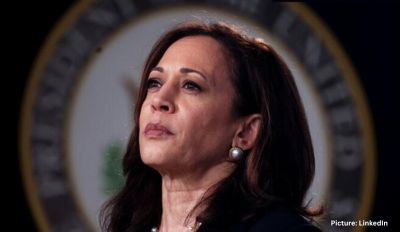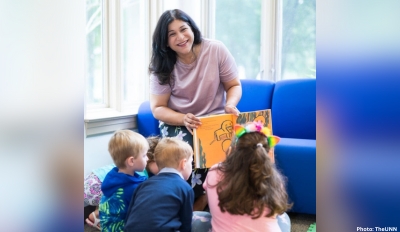In preparation for the US general elections 2020, to choose a successor to President Donald Trump, the first round of the Democratic debates featured twenty candidates and six moderators, spread across two nights of primetime TV last week. One of the remarkable visual aspects of the debate was the diversity of candidates on the stages: six women, five people of color, a member of the LGBTQ community, and an age range from 37 to 77. And the most historic part of the debates was the success of women in different roles and on different nights. The story, however, was not that women excelled. The story was that the three individuals excelled, and they happened to be women.
California Senator Kamala Harris was the third-highest-polling candidate in the second night of the debate and emerged the most potent. She spoke thoughtfully and passionately about topics ranging from health care to immigration to race to climate change, which she called a “climate crisis”. And Senator Harris was effectively able to bridge a gap in the party that few have been able to do—she showed herself to be a progressive without labeling herself a socialist. She showed that while she agrees with Bernie Sanders on some ideas, she is not beholden to his ideology. She used her background as a prosecutor effectively. What we saw was someone in tune with the average Democratic voter: an independent individual with a diverse set of views.
Ultimately, three individuals showed their colleagues—candidates and journalists alike—what a stellar performance looks like. Those individuals performed well because they were prepared, thoughtful, and connected well with the constituencies with whom they needed to connect. They showed why they deserved to be on that stage—on either side of the dais. They provided key voices in the most important decision over the next 17 months—the choice over our next president. And as a tribute to how far we have progressed as a society and a culture, it is almost a footnote that those individuals are women. And all those men on stage better have been taking notes.
Rival Democratic presidential contenders pummeled former vice president Joe Biden with searing, emotional critiques Thursday at their first debate — denouncing his record on racial issues and calling on him to pass the torch to a new generation of leaders.
In one of the most dramatic moments of the campaign season, Biden found that his long-held stature as a beloved party leader offered him no respite at the center of a crowded debate stage, given his early domination of national polling in the race.
While candidates debated whether “socialism” was a term to eschew or embrace, Sen. Harris spoke about policies and ideas while leaving her colleagues—most of them male—in the dust. As a woman of color she experiences a high level of scrutiny. Yet, she effectively balanced what was necessary to show herself to be a serious player and a top-tier candidate in the Democratic primary: strength, resolve, compassion, and detail.
And finally, Kamala Harris took the hardest and most effective hit at the Democratic frontrunner, Joe Biden. In an exchange over the issue of race, Kamala Harris got the better of the former Vice President when she asked about his position against school busing in the 1970s. Decades later, the party has a different perspective on race. Harris gave voice to that better than anyone else and instead of making a clumsy reference to Biden’s age (as Congressman Eric Swalwell did early on), she reminded voters that Biden sometimes seems to be from a different era.
Sen. Kamala D. Harris of California, who commanded the event at several points in the night, led the charge. “I do not believe you are a racist. I agree with you when you commit yourself to the importance of finding common ground,” Harris said. “But I also believe, and it’s personal . . . it was hurtful to hear you talk about the reputations of two United States senators who built their reputations and career on segregation of race in this country.”
She accused him of opposing policies that allowed black girls like her to attend integrated schools. “There was a little girl in California who was part of the second class to integrate her public schools, and she was bused to school every day,” she said. “That little girl was me.”
Harris was not the only one to set her sights on Biden. Sen. Michael F. Bennet (Colo.) attacked him for striking a deal with Republican leaders to keep some of George W. Bush’s tax cuts. And Rep. Eric Swalwell (Calif.), 38, opened a generational front, calling Biden, 76, to “pass the torch” to a new generation of leaders.
Trump, who was attending the Group of 20 summit in Japan, was paying attention to the debate and weighed in after all 10 Democrats raised their hands to declare that they would support providing health care for undocumented immigrants.
“All Democrats just raised their hands for giving millions of illegal aliens unlimited health care,” Trump said on Twitter during the debate. “How about taking care of American Citizens first!? That’s the end of that race!”
Asked if they believed crossing the border into the United States without proper documentation should be downgraded from a criminal offense to a civil offense, almost every candidate again raised their hand.
The display, which Republicans seized on as evidence of Democratic support for “open borders,” came a day after the issue of decriminalizing undocumented migrants emerged as a flash point during the first round of the debate. Former housing and urban development secretary Julián Castro sharply criticized former congressman Beto O’Rourke of Texas for opposing legislation to repeal part of U.S. immigration law that allows for criminal prosecution of migrants who come to the United States without proper documentation
Health care dominated the early portion of the debate, with the candidates discussing ideas for moving toward universal coverage. Sanders and Harris were the only two candidates to raise their hands when asked if they would eliminate private health insurance in favor of a government-run plan, echoing similar pledges Wednesday by Sen. Elizabeth Warren (Mass.) and New York Mayor Bill de Blasio. Harris, one of only two people of color on the stage, asked to speak, positioning herself as the candidate best qualified to handle racial tension — and therefore, best able to stage what amounted to a personal attack on the former vice president.
It was one of many authoritative moments for Harris, who channeled the forceful prosecutor approach that earned her national attention in Senate hearings with Supreme Court Justice Brett M. Kavanaugh, Attorney General William P. Barr and others. Since drawing 22,000 people to her January campaign launch in Oakland, Calif., Harris has failed to seize a place in the top three in early polls, hovering just outside the tier consistently occupied by Biden, Sanders and, more recently, Warren.
Harris began making a case against Biden by offering delicate criticism of former president Barack Obama’s record of deporting millions of undocumented immigrants — saying that while she respected Obama, she disagreed with his deportation policy.
She went in for the more direct hit on Biden’s record on race, which ended with her asking if Biden stands by his position on busing today.
Elizabeth Warren on night #1
Massachusetts Senator Elizabeth Warren opened the first night blending a strong opening statement and an answer to the actual question asked. She showed confidence, knowledge, and preparedness. She was calm and put forth policy ideas without being boring and trapped in the weeds. She appealed to a wide range of people—from the white working-class voters believed to be ignored by Democrats in the last election to women to young people to the LGBTQ community.
Of those on the stage, Warren had the most to lose; she was polling highest among the 10 candidates on that stage. She didn’t stumble. There were few attacks on her, and none that was direct. But she also didn’t commit an error that opened her up to attack or broad criticism. Instead, she spoke about gun control, immigration, and health care—issues that can be controversial even within the party—without striking a negative tone with her Democratic colleagues.
In the second hour of the debate, Warren sank back into the shadows without being overshadowed. As Democratic candidates—particularly those polling poorly—became feisty in an effort to make their mark and become a cable news clip, Sen. Warren was quieter. But she also wasn’t a target. Sniping happened more in the second hour but throughout the debate, there were attacks. Julian Castro leveled Beto O’Rourke on immigration. Tulsi Gabbard made Tim Ryan look unprepared on foreign policy. Amy Klobuchar effectively injected the issue of gender by rebutting Jay Inslee on the issue or reproductive rights. But Elizabeth Warren was never a target. Through it all, she was the most effective candidate on the stage on the first night.
Savannah Guthrie, a model of moderation on night #2
Both debate nights featured six moderators peppering the candidates with questions. One individual stood out as a model of who a moderator should be. She held candidates to account, asking tough questions and posed pointed follow-ups. I wrote this spring about the need for better moderators in this year’s debates, and while some, particularly Chuck Todd, did not meet that call, Savannah Guthrie made her profession proud.
She asked specific, well-informed questions that did not pander to candidates’ lofty rhetoric, but asked them to discuss their ideas within the realities of politics. She was able to control the debate without shouting any of the candidates down nor excluding candidates from the conversation. Ms. Guthrie was not a candidate for president, but the moderator can have as powerful of an effect on public understanding as the candidates, and she played an effective role in the debates.
This debate may not be the last time Ms. Guthrie has a hand in a debate featuring presidential candidates. (It should not be.) But what she did over the course of two summer nights among 20 Democrats was to show future moderators how to do their job.


